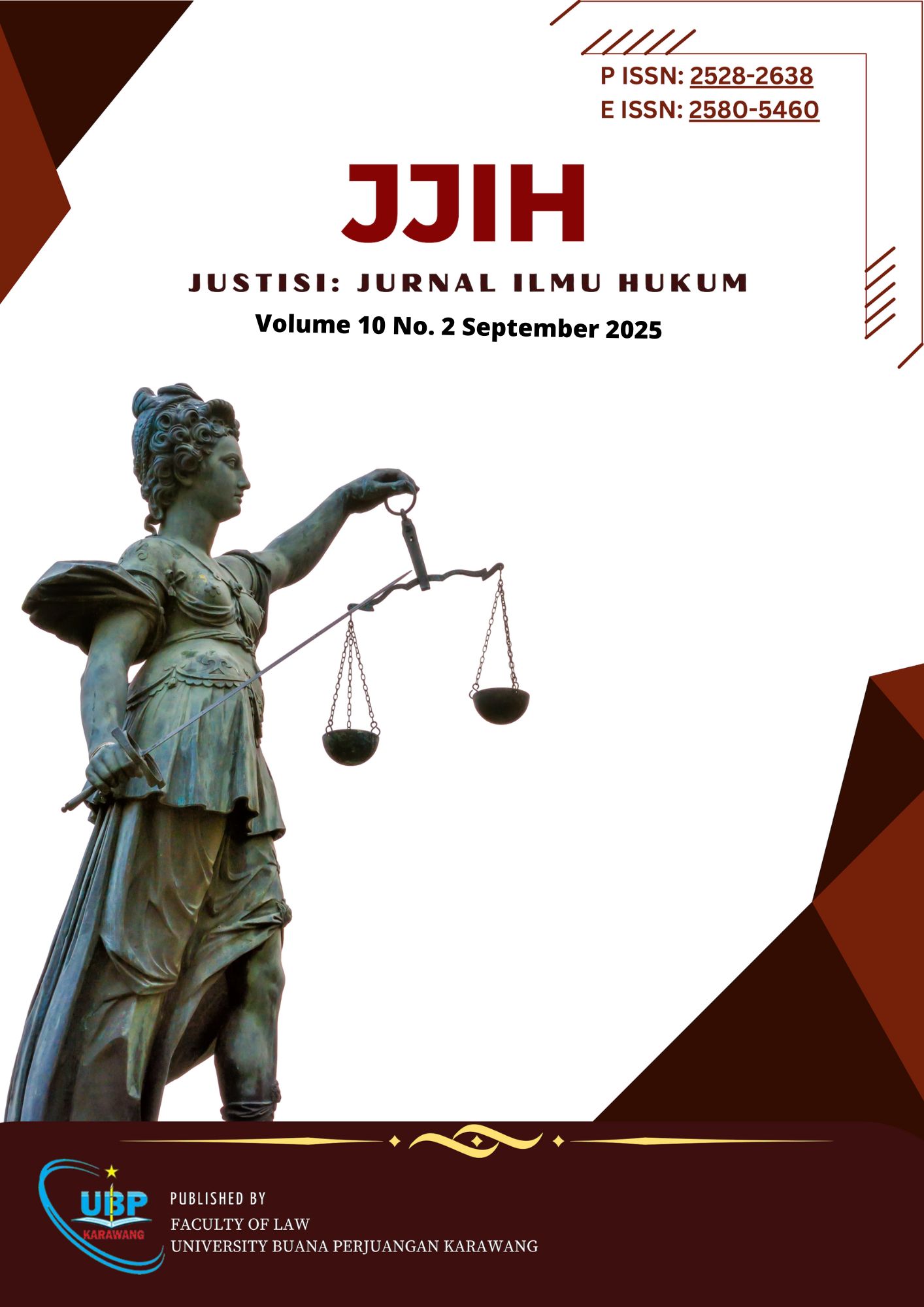CRIMINAL LAW LIABILITY FOR PERPETRATORS OF EMBEZZLEMENT IN OFFICE FOR THE AGGRIEVED PARTY
DOI:
https://doi.org/10.36805/nrqd8p34Keywords:
Accountability, Criminal Law, Perpetrators, Embezzlement in Office.Abstract
The crime of embezzlement in office is closely related to morality and trust in the honesty of individuals. These crimes, which are regulated in the Criminal Code (KUHP), are often difficult to identify because the perpetrators are in one institution, organization, or company. This study uses a juridical-normative approach to analyze legal norms related to embezzlement in office as a form of justice for the aggrieved party. Through a legislative, conceptual, and case study approach, this study explores relevant regulations, legal concepts, and court decisions, such as Decision Number 375/Pid.B/2024/PN Jkt.Brt and Decision Number 396/Pid.B/2024/PN Jkt.Brt. The sources of legal materials used include primary, secondary, and tertiary materials obtained through literature studies. Qualitative descriptive analysis techniques are applied to systematically manage data, while content analysis methods help to understand the meaning and relevance of the law in the context of this research. The results of the study show that the factors that influence the behavior of embezzlement in positions by employees include financial, psychological, and work environment factors. The study also found that embezzlement could be prevented by raising awareness of employee ethics and integrity and strengthening management oversight. Criminal law liability for company losses must be upheld to provide justice and sanctions for the perpetrators, in accordance with Article 374 of the Criminal Code
References
A. Buku
Andi Hamzah, KUHP Dan KUHAP, (Rineka Cipta, Jakarta, 2012).
Andi Sofyan dan Nur Azisa. Hukum Pidana, (Makassar: Pustaka Pena Press, 2016).
Jhony Ibrahim, Teori dan Metode Penelitian Normatif, (Malang: Banyumedia Publishing, 2007).
Muladi dan Barda Nawawi Arief, Teori-Teori Dan Kebijkan Pidana, (P.T. Alumni, Bandung, 2010.
Muhamad Sadi Is. Pengantar Ilmu Hukum, (Jakarta: Kencana, 2015).
Ronny Hanitijo Soemitro, Metodologi Penelitian Hukum dan Jurimetri (Jakarta: Ghalia Indonesia, 1990).
R. Soesilo, Kitab Undang-Undang Hukum Pidanaserta Komentar-Komentarnya Lengkap Pasal Demi Pasal. (Bogor.Polite 1995).
R. Soesilo, Kriminologi (Pengetahuan Tentang Sebab-Sebab Kejahatan, (Politeia, Bogor, 2015).
Topo Santoso, Kriminologi, (PT Rajagrafindo Persada, Jakarta, 2001).
Tongat,2006, Hukum Pidana Materil, UMM Pres, Malang.
Wirjono Prodjodikoro, Asas-asas Hukum Pidana di Indonesia, Refika Aditama, Bandung: 2009.
Yahman. Karakteristik Wanprestasi Tindak Pidana Penipuan: Yang Lahir Dari Hubungan Kontraktual, (Jakarta: Kencana, 2014).
B. Putusan Pengadilan
Putusan Nomor 375/Pid.B/2024/PN Jkt.Brt.
Putusan Nomor 396/Pid.B/PN Jkt.Brt.
C. Jurnal
Meilanny Budiarti S. Mengurai Konsep Dasar Manusia Sebagai Individu Melalui Relasi Sosial Yang Dibangunnya, Prosiding KS: Riset & PKM, Vol. 4, No. 2, (Januari 2017).
Mahendri Massie, Tindak Pidana Penggelapan Dalam Menggunakan Jabatan Berdasarkan Pasal 415 KUHP. Jurnal Lex Crimen. Vol. VI/No. 7/ Sep/2017
Yoga Saputa Alam, Erlina B. Anggalana (2021). Analisis terhadap Pelaku Tindak Pidana Penggelapan Dalam Jabatan (Studi Putusan Nomor: 431/Pid.B/2020/PN.Tjk). Jurnal Pro Justita, Vol.2, No.2.

Downloads
Published
Issue
Section
License
Copyright (c) 2025 katarina sani, Didik Suhariyanto, Puguh Aji Hari Setiawan

This work is licensed under a Creative Commons Attribution 4.0 International License.
Deposit & Pengarsipan Mandiri
Naskah artikel versi pra-cetak (draf awal), versi diterima (draf akhir), dan versi penerbit (PDF terbitan) boleh diarsipkan mandiri di situs web pribadi atau repositori institusional milik penulis dengan tetap mencantumkan status progres dan sumber asli yang merujuk pada website jurnal ini.
Preservasi & Pengarsipan Sistem
Jurnal ini tergabung dalam jaringan PKP Preservation Network, yang menyediakan layanan preservasi dan pengarsipan secara otomatis apabila terjadi sesuatu yang menyebabkan jurnal ini tidak terbit lagi (trigger event).



